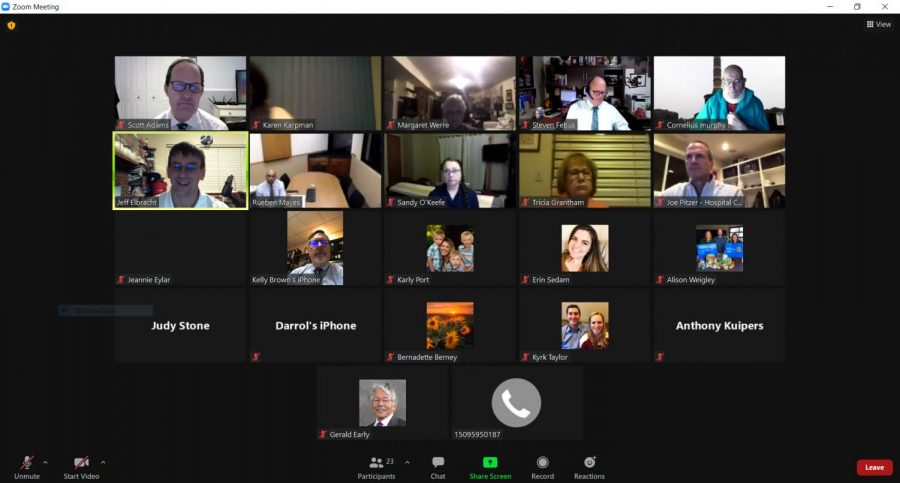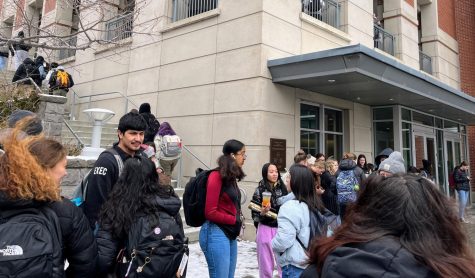Hospital discusses visitor guidelines, mental health
Families of terminal patients now allowed in hospital; mental health of youth impacted by COVID-19
“The community’s biggest need that we have right now is for children and adolescents. [Children] have a hard time managing some of these stresses,” said Karly Port, executive director at PRH Clinic Network.
February 5, 2021
The Pullman Regional Hospital Board of Commissioners discussed new guidelines for hospital visitors of terminal patients, the current financial status of the hospital and COVID-19 effects on mental health during a meeting Wednesday.
Administrative Update
Pullman Regional Hospital is now allowing the families of terminal patients to be in the hospital as long as they do not have COVID-19, said Jeannie Eylar, PRH chief clinical officer. There are still restrictions in place for visitors, so decisions are made on a case-by-case basis.
Using funds received from palliative care programs, the hospital placed electronic communication systems in rooms so patients could talk with their families, said Tricia Grantham, vice president of the PRH Board of Commissioners.
Vaccinations
The hospital has been administering COVID-19 vaccines since Dec. 18, 2020, Eylar said.
Eylar said the hospital began distributing vaccines more rapidly after Gov. Jay Inslee became frustrated with the small percentages of the vaccine being administered.
Whitman County has now administered a total of 7,500 vaccines. The hospital has administered 1,300 of that total, she said. On Feb. 13, the hospital will start administering the second dose of the vaccine.
Financial Overview
The board reviewed how hospital finances were impacted by COVID-19. Steve Febus, PRH chief financial officer, said the hospital ended the year with $3.3 million in revenue.
Funds available to the hospital through the CARES Act Provider Relief Fund helped support the hospital during difficult times, Febus said.
The hospital received $5.5 million for COVID-19 relief from the fund. The money was used to set up COVID-19 testing stations and administer the vaccine, as well as for general prevention and preparation to handle the pandemic, he said.
Rueben Mayes, PRH chief development officer, said the hospital put on a number of charity events in 2020 to raise money. The hospital also applied for the M.J. Murdock Charitable Trust fund and received an additional $50,000 for COVID-19 relief.
Behavioral Impacts of COVID-19
PRH is currently assessing how people are managing the psychological effects the pandemic has caused, Grantham said.
There have been more signs of backlash and acting out in youth because of how long the pandemic has gone on, said Margaret Werre, retired nurse and member of the PRH Board of Commissioners.
The pandemic is predicted to have long-term effects on the mental health of youths. It is important for families to consult with their pediatricians, said Karly Port, executive director at PRH Clinic Network.
“The community’s biggest need that we have right now is for children and adolescents,” Port said. “[Children] have a hard time managing some of these stresses.”
The hospital will be uploading resources onto their website to help support and offer advice to families struggling amidst the pandemic, Werre said. Resources include a behavioral health toolbox.
Werre said the biggest concern right now is that the hospitals in Whitman County are understaffed. There are not enough healthcare workers to provide sufficient care to meet the needs of all of the youth suffering in the community.
Representatives from the hospital are meeting regularly with psychiatric providers and counselors, including health care workers at WSU, Eylar said.
The rates of depression and stress are high. It is becoming increasingly harder for parents to balance work and look after their children, she said.
Although the rates are high, the hospital has not seen the number of psychiatric and behavioral issues reported in the PRH Emergency Department increase, Eylar said. This may be because of the lack of college students in the area.
Eylar said an increase in psychiatric and behavioral cases should be expected once students return to campus.
The hospital has turned to mental health providers and social workers to help create solutions that will meet the needs of the community, said PRH CEO Scott Adams.
PRH has also received funds to provide people with motivational interviewing as a way to help them manage mental health issues, he said.
“We’ve gotten grants to help deal with things like motivational interviewing as a way to help people manage and find within themselves opportunities to deal with some of their health issues,” Adams said.
There is currently a national shortage of mental health providers. Washington state currently ranks 48 in the country for available mental health services, he said.






















